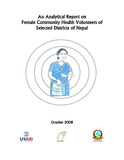Please use this identifier to cite or link to this item:
https://hdl.handle.net/20.500.14356/787Full metadata record
| DC Field | Value | Language |
|---|---|---|
| dc.contributor.author | USAID | |
| dc.contributor.author | NEW ERA | |
| dc.contributor.author | Government of Nepal | |
| dc.date.accessioned | 2013-01-01T19:00:30Z | |
| dc.date.accessioned | 2022-11-08T10:20:38Z | - |
| dc.date.available | 2013-01-01T19:00:30Z | |
| dc.date.available | 2022-11-08T10:20:38Z | - |
| dc.date.issued | 2008 | |
| dc.identifier.uri | http://103.69.126.140:8080/handle/20.500.14356/787 | - |
| dc.description.abstract | Executive Summary: Female Community Health Volunteers (FCHVs) act as a bridge between the government and the community and serve as a frontline for local health resources. Along with providing community-based health and family planning services, they play an important role in contributing to a variety of key public health programs, including family planning, maternal care, sick childcare, Vitamin A supplementation/ de-worming, and immunization coverage. The objectives of the 2008 study of Female Community Health Volunteers (FCHVs) in Twenty Districts of Nepal, in addition to monitoring the performance of the NFHP, was to see the existing condition of the FCHVs working in the communities of Nepal. The Female Community Health Volunteers (FCHV) survey was intended to collect information on basic health services provided by FCHVs to the community in terms of the provision of specific commodities and the provision of information, communication, counseling, and other support to the rural community. The overall levels of contact between FCHVs and the government health system, and their continued training appears good in most districts. FCHV performance is closely linked to supplies, support (for example from the Nepal Family Health Program), and motivation. Findings from the survey show that FCHVs are not aware of all pregnancies, births, instances of sickness among young children, and other health issues in their area. With additional support and motivation, FCHVs can reach a higher percentage of people in need of some very basic services. Their ability to provide good quality services depends on support from the public sector as well as information provided to families about the availability of these services in their communities. | en_US |
| dc.language.iso | en_US | en_US |
| dc.publisher | USAID | en_US |
| dc.subject | Health Volunteers | en_US |
| dc.subject | Nepal | en_US |
| dc.title | An Analytical Report on Female Community Health Volunteers of Selected Districts of Nepal | en_US |
| dc.type | Technical Report | en_US |
| Appears in Collections: | Post Graduate Grant (PG) Reports | |
Files in This Item:
| File | Description | Size | Format | |
|---|---|---|---|---|
| 605.pdf | Full Text. Download | 980.84 kB | Adobe PDF |  View/Open |
Items in DSpace are protected by copyright, with all rights reserved, unless otherwise indicated.
